Another Jeffrey Sachs Center Outreach Programme
In Collaboration with Rotary Club of Bukit Kiara Sunrise, SMK Seri Hartamas and the Sea Monkey Project
On 12th February 2020, the Jeffrey Sachs Center on Sustainable Development (JSC), in collaboration with the Rotary Club of Bukit Kiara Sunrise, SMK Seri Hartamas and the Sea Monkey Project, conducted an interactive session to impart key awareness and mobilization skills to students of SMK Seri Hartamas on the issue of single-use plastic waste. The session was conducted in the school compound as part of a larger empowerment programme convened by the Rotary Club of Bukit Kiara Sunrise.
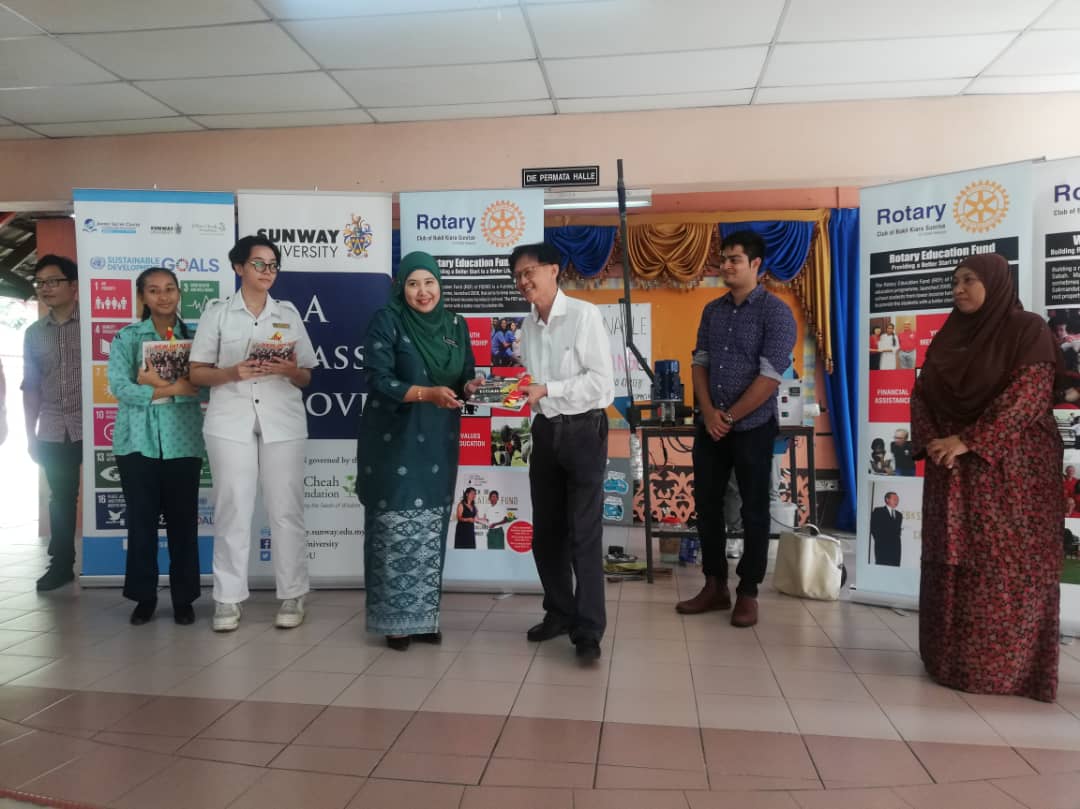
Presentation of Token of Appreciation by Puan Suzieany Mohammed Harris, Principal of SMK Seri Hartamas to Professor Leong Choon Heng, Deputy Director of the Jeffrey Sachs Center on Sustainable Development.
The session comprised of opening speeches by the President of the Interact Club, Mulaika Nordin, Pn Suzieany Mohammed Harris,Principal of SMK Seri Hartamas and Anthony Pinto, President of the Rotary Club of Bukit Kiara Sunrise. Steven Robinson, the Rotary Club’s Vocational Service Director, gave opening remarks to the interactive session on plastics with an overview of plastic usage statistics and a brief overview of existing government policies targeting plastics.
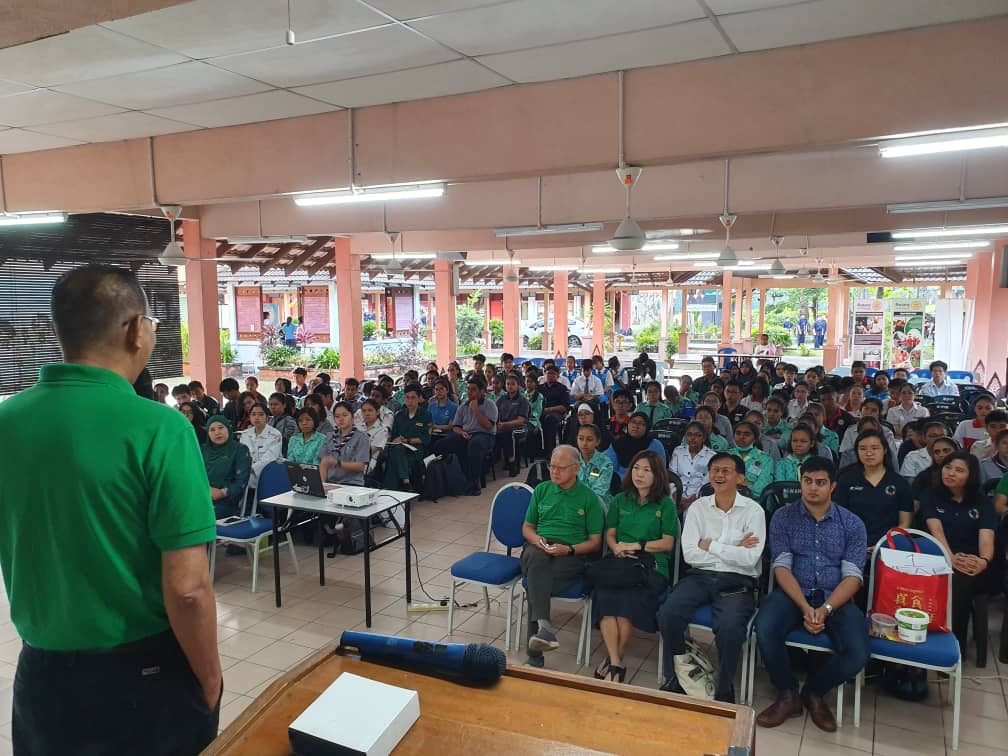
Present were members of the SMK Seri Hartamas Interact Club and school prefects.
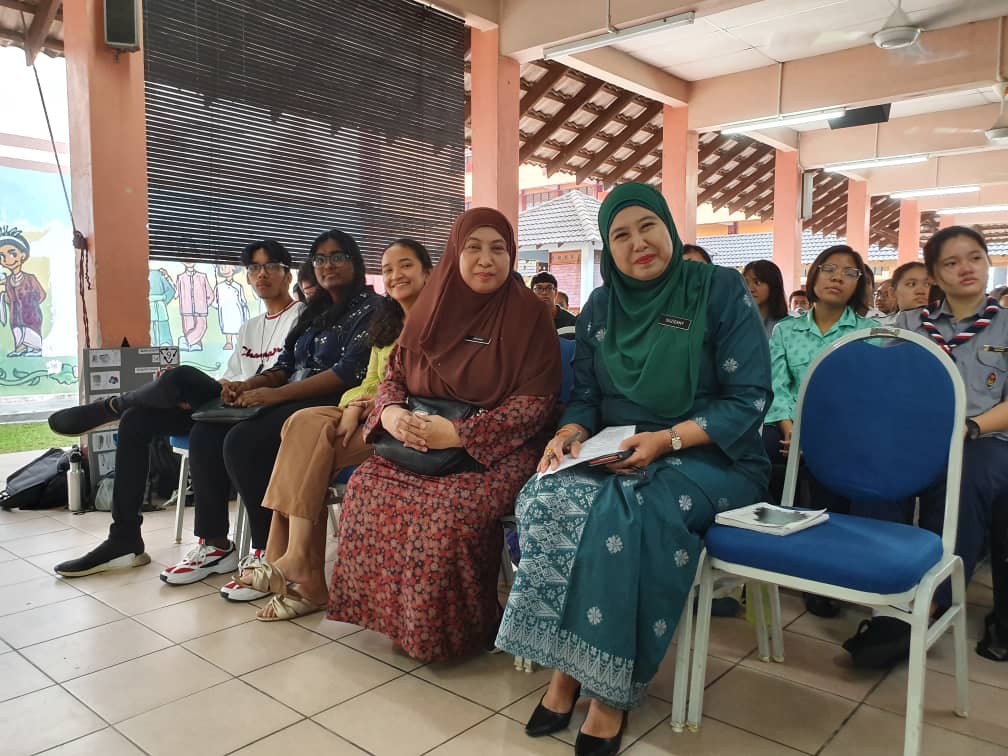
From left to right: Mohd Adam Alexis Hizamshah, Grace Alice Ninan and Tengku Kellysya Tengku Shah Marudin from the Rotaract Club of Bukit Kiara, Pn Rohana Md Noh, Cocurricular Head of SMK Seri Hartamas and Pn Suzieany Mohammed Harris, Principal of SMK Seri Hartamas.
As part of an ongoing collaboration with the Rotary Club of Bukit Kiara Sunrise, JSC delivered academic knowledge on plastic waste management as non-specialist language. Content was broken up into sections framed within a global citizenship perspective. Each section focused on a singular aspect of the plastics waste issue and used experiential learning to enable learners to make informed judgement, engage in reflection and broaden existing perspectives on the issue to increase capacity for individual, school and community initiatives.
The five areas covered in the session were:
- Overview of Plastics Waste Management
- Plastic in Daily Life: A Reflection
- Degradation Time of Plastics: An Experiential Continuum
- Problems with Plastic Waste: Hazards to Food Chain and Drinking Water
- Solutions-developing Approach: A Mindfulness-based Activity to Increase Resilience
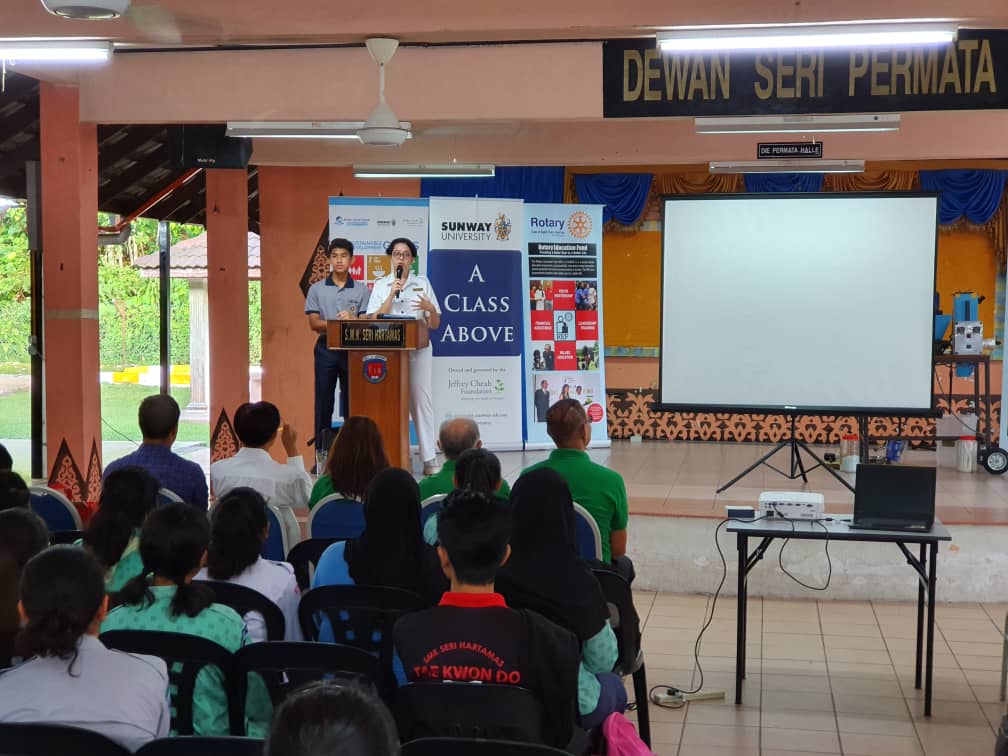
Interact Club President Mulaika addressing students to encourage students to take action to reduce plastic waste. On her right is co-MC Muhammad Harith Mohamed Zaini, SMK Seri Hartamas student and Interactor.
JSC’s session served to empower students as global citizens. In addition to knowledge on long-term hazards of plastic waste and challenges to reducing plastic waste consumption, students were furthermore empowered to make behavioural changes as part of the solution in line with existing school-wide efforts to reduce canteen and individual plastic waste.

Students reflected on plastic degradation timeframe; pictured: Kong Phui Yi from JSC and Michael Golub from the Sea Monkey Project
Apart from delivering key information on plastics, a skills transfer was conducted whereby students were guided using mindfulness to self-resource as a means of being grounded within their own solutions-seeking process in the face of a large-scale issue. Combining knowledge with skills equips students to approach societal issues with level-headed integrity and pursue alternative behaviour in line with sustainable development.
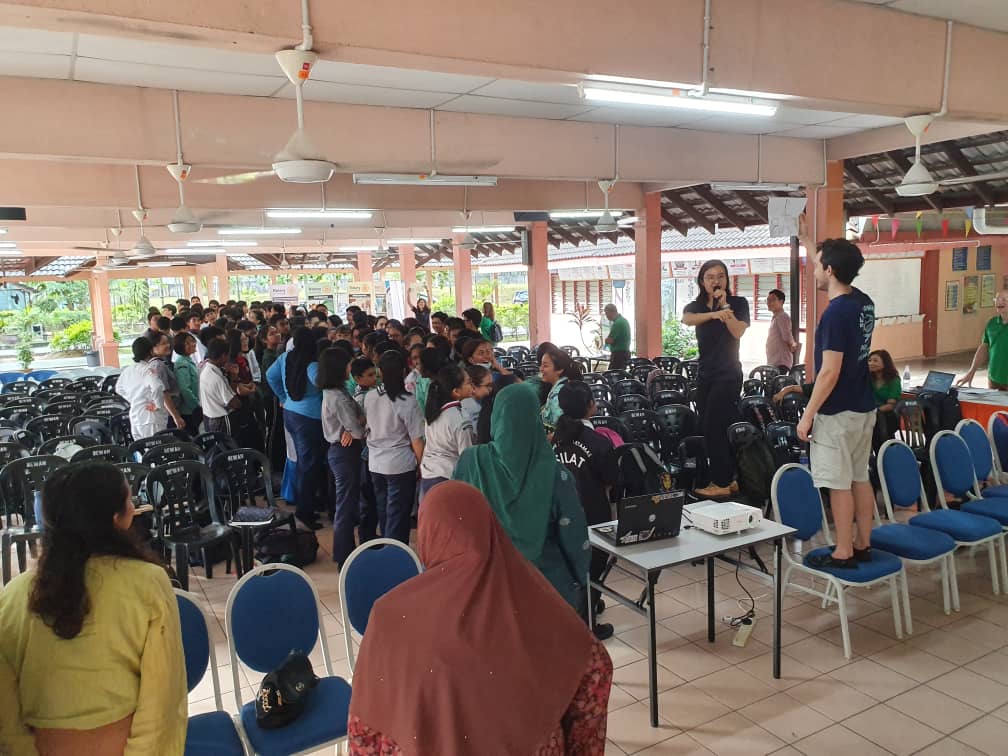
Students participated in an interactive activity on plastic degradation time
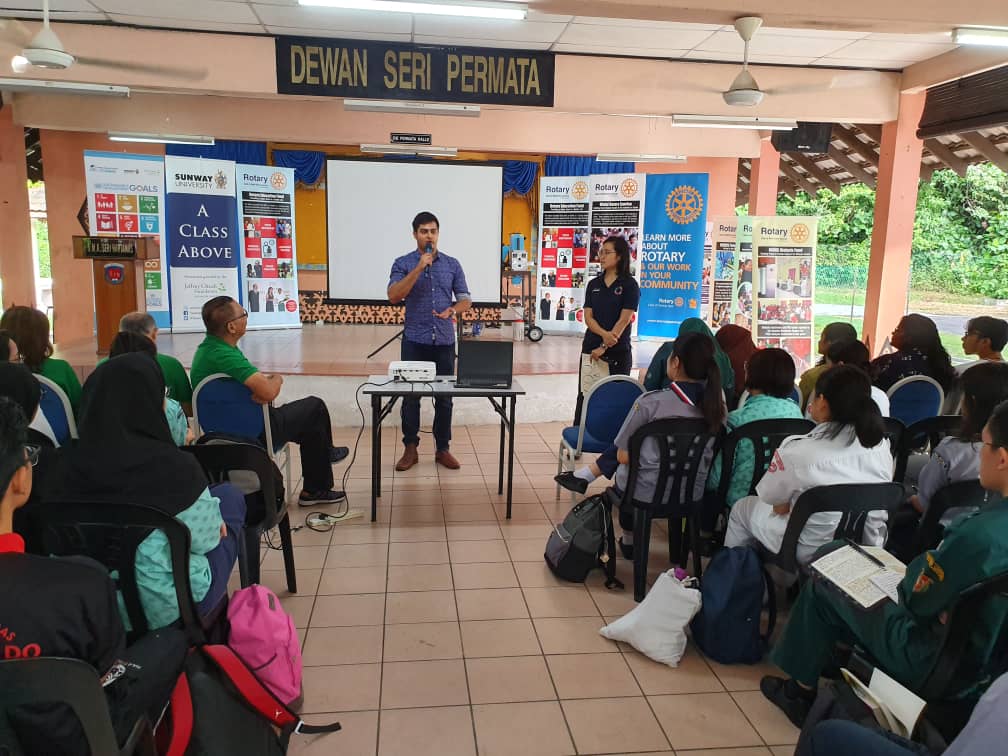
JSC’s intern, David Frank Ahimaz conducted a sharing session on plastic waste’s effects on the environment and the food system.

Ee Pei Vi (Far Left) and Nurul Iman Mahamad Fuad (Far Right) and two SMK Seri Hartamas students feeding material into the plastics shredder
The main programme involved a sharing by the Sea Monkey Team comprised of Ee Pei Vi, Nurul Iman Mahamad Fuad and Michael Golub. The Sea Monkey project involves youth-led plastic waste solutions to serve as inspiration to the students to become entrepreneurs of sustainable solutions. The Sea Monkey machine facilitates plastic upcycling, enabling a localised circular economy. Coastal communities in South East Asia have benefited from the installation of plastics recycling machines to better manage plastic waste. The machine empowers communities to divert plastic waste from marine sources to be used as raw material for new products. This machine enables communities to create new income streams for improved economic welfare while reducing plastic pollution. SMK Seri Hartamas students were then given a live demonstration of a plastics recycling machine.
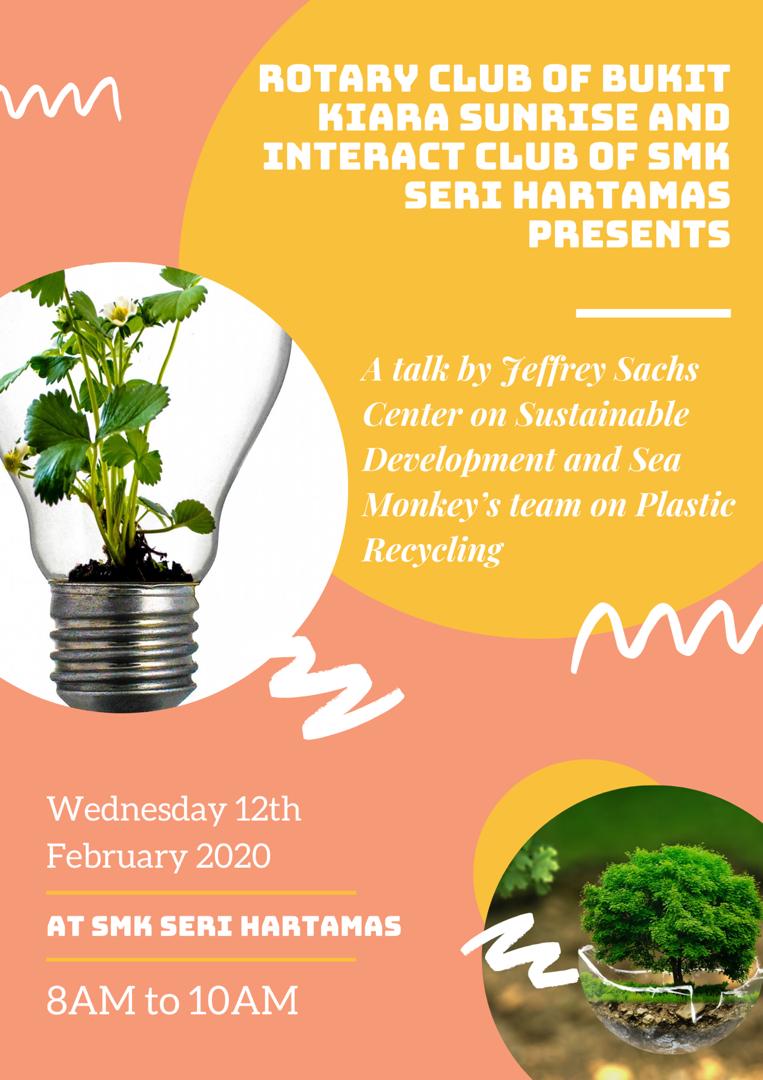
The entire session concluded with a solutions-gathering activity by Steve Robinson. Vocational Service Director of the Rotary Club of Bukit Kiara Sunrise. Solutions were gathered for further tabulation by the Interact Club to inform next steps in reducing plastic waste generated by students, staff and the school canteen.
This event was made possible by the convening efforts of Steve Robinson, Vocational Service Chair of the Rotary Club of Bukit Kiara Sunrise, Pn Suzieany Mohammed Harris and Pn Rohana Md Noh Principal and Co-Curricular Head of SMK Seri Hartamas, Pn Thanbeer Kaur, SMK Seri Hartamas Interact Club Teacher Advisor, and Prof Leong Choon Heng and Amirah Majid, JSC Deputy Director and Outreach and Education Executive.
The Jeffrey Sachs Center has a Memorandum of Understanding with the Rotary Club of Bukit Kiara Sunrise as of November 2019. This MoU facilitates knowledge transfer from the Jeffrey Sachs Center to the Rotary Club of Bukit Kiara Sunrise, via joint projects on sustainable development and co-development of initiatives to advance the United Nations Sustainable Development Goals.
Photo Credit: Dr Yee Yoke Leong
If you or your organisation would like to collaborate or partner with the Jeffrey Sachs Center, kindly send an email to @email.



